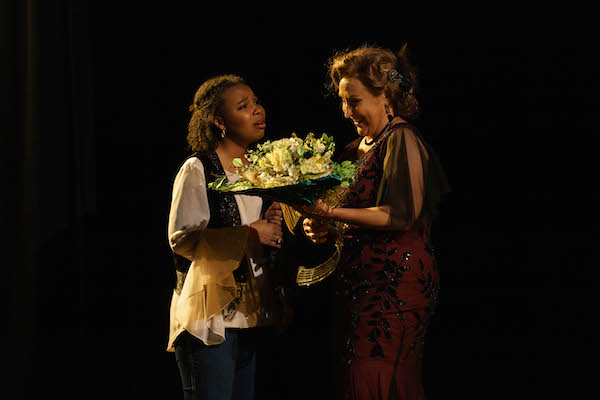Heggie’s slight “Three Decembers” receives exemplary staging in FGO’s retooled American season

While most American opera companies have cancelled their seasons in the wake of the Covid-19 pandemic, Florida Grand Opera has taken a more innovative approach.
In place of the originally scheduled season of large-scale productions at Miami’s Arsht Center, FGO’s general director Susan Danis is presenting a series of one-act operas by American composers. FGO has moved the company’s down-sized season to the more intimate Miami Theater Center in Miami Shores.
These works were unlikely to have been produced on South Florida stages and Danis and her artistic team deserve great credit for taking this opportunity to expand the organization’s musical reach and give audiences the chance to experience another side of the operatic canon.
The revised season opened Saturday night with Three Decembers by Jake Heggie. Heggie is one of the leading opera composers of the current era. His operatic settings of Moby Dick and Dead Man Walking have been highly acclaimed and widely performed.
While Heggie’s Three Decembers is considerably less than a timeless masterpiece, the first-class production and musical values make this presentation well worth seeing.
Originally premiered in 2008, Three Decembers is a slender fusion of music and overheated melodrama. Based on a play by the late Terrence McNally, the opera is the tale of Madeline Mitchell, a famous actress, and her troubled relationship with her two grown children. Her daughter Beatrice suffers a hapless marriage with an unfaithful husband while her son Charlie is gay and his partner, who Madeline has never accepted, becomes a casualty of the AIDS epidemic. Both children believe their mother has neglected them after their father’s death, supposedly from a traffic accident, in favor of her career and fame. Set around Christmas in 1986, 1996 and 2006, accusations are hurled, dark secrets revealed and family problems examined, leading to a catharsis of sorts following Madeline’s sudden demise. It all adds up to an upscale soap opera that tries to tug at the heartstrings in a too obvious manner. Gene Scheer’s verbose and clunky libretto does not help matters or elevate the material.
Heggie’s revised version runs a compact 90 minutes with a score that veers between animated recitative and musical theater. Madeline’s initial aria “Daybreak at last” suggests Stephen Sondheim and a duet about shoes could well come from a Jerry Herman musical. Though undeniably one of Heggie’s lesser efforts, a composer of his talent still manages to deliver some lovely and ruminative moments. Beatrice and Charlie’s duet about remembrances of their father is evocative and touching. An early trio for the three principals is stirring in a Coplandesque Americana manner and the final scene, a memorial service for Madeline at a Broadway theater, is potently moving while managing to transcend dramatic cliché.
The role of Madeline is a musico-theatrical tour de force, originally conceived for the celebrated mezzo-soprano Frederica von Stade. Emily Pulley, a soprano with Met credits who played Beatrice in some of the opera’s previous stagings, seizes the opportunity to the fullest, delivering a vocally sumptuous performance. Pulley manages to humanize Madeline , underplaying the heroine’s unsympathetic side. Her rich timbre offers a high register that rings through the house like steel while encompassing the role’s varied vocal demands. In the score’s more Broadway-centric moments, Pulley radiates the ease of a natural chanteuse. Her stage presence is nothing short of charismatic. Even when she is silently reacting to her children’s anger, one’s attention is firmly focused on this gifted singing actress.
Efraín Solís is a sympathetic Charlie. His large, evenly produced baritone can manage fierce declamation and warm-toned lyrical arioso without strain. He made the listener feel both the character’s desperation and frustration and sadness at his mother’s lack of empathy.
Beatrice is a less clearly defined character but Amanda Sheriff, a member of the FGO Studio Artist program, is a real find. With soft high tones that caress the ear and the ability to fully command the stage, her voice blended felicitously with Solis in their duets. She displayed deep pathos in Beatrice’s alcohol-tinged narrative of her loveless marriage.
The Miami Shores theater proved a fine venue for chamber opera with clear sight lines and a voice-friendly acoustic. Unfortunately, the house lacks an orchestra pit; the 11-member instrumental ensemble was placed on a platform to the right of the stage.
Gregory Buchalter is artistic director of Opera Fairbanks and has been a member of the Met’s music staff. The conductor managed balances effectively, bringing out the subtleties of Heggie’s busy instrumental writing without overpowering the singers. Prominent violin and cello solos were well played and articulated.
Director Jeffrey Buchman moved the action briskly, playing the confrontational scenes for maximum effect and delineating the principals’ dilemmas with subtle fluidity. Howard Tsvi Kaplan’s simple but purposeful sets and colorful costumes, particularly Madeline’s knockout gowns, were eye-catching.
A small, socially distanced audience gave the artists a rousing standing ovation. Despite the unevenness of Three Decembers, the high artistic level of the entire presentation bodes well for this reconceived season of American operatic theater.
Florida Grand Opera repeats Three Decembers 3 p.m. Sunday at the Miami Theater Center, 9806 NE 2nd Avenue in Miami Shores.
On February 13 and 14 FGO presents New York Stories, three one-act operas by Daron Hagen. fgo.org
Posted in Performances
Leave a Comment
Sun Jan 31, 2021
at 10:55 am
No Comments






